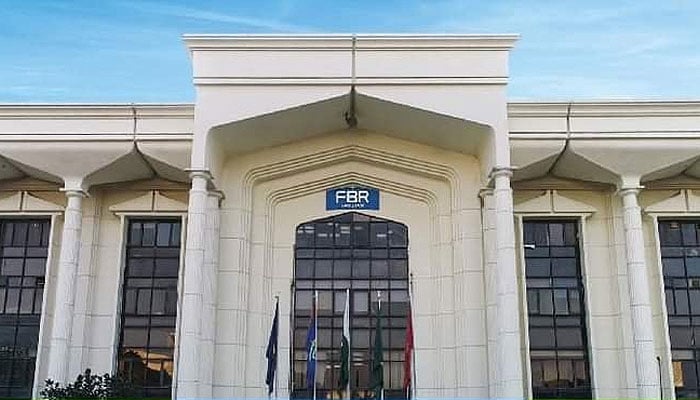Experts urge creation of tax authority, recommend FBR overhaul
They recommended that the current workforce of FBR apply to join the NTA based on merit
ISLAMABAD: Two independent tax experts have proposed the establishment of a National Tax Authority (NTA), suggesting the dissolution of the existing Federal Board of Revenue (FBR).
They recommended that the current workforce of FBR apply to join the NTA based on merit. The government could offer the remaining employees a golden handshake or absorb them into other public sector departments.
On Wednesday, the Senate Standing Committee on Finance and Revenue received a detailed briefing from experts Haroon Khawaja and Dr. Ikramul Haq. Haroon Khawaja outlined the proposed overhaul of the tax machinery, stating that the FBR currently employs 18,332 officers and staff, with a salary bill and perks totalling Rs52 billion. He recommended halting further recruitment and encouraging the existing workforce to apply for positions at the NTA, based on merit. The remaining employees should focus on bringing new taxpayers into the tax net, with their performance assessed accordingly. Employees not selected for the NTA could be absorbed into other departments, or a golden handshake could be offered, if deemed necessary by the government.
The presentation emphasised that the tax-to-GDP ratio could be increased to 18% at the federal level through administrative reforms centred around the NTA.
Jointly prepared by Haroon Khawaja and Dr. Ikramul Haq, the presentation analysed the historical failures of the FBR and proposed replacing it with a modern, taxpayer-friendly agency that would not only raise revenue but also manage social payments.
The NTA’s structural framework would include financial autonomy and authority to hire and fire, similar to the State Bank of Pakistan. The appointment of NTA’s chairman and board members would be subject to parliamentary oversight through open public hearings.
The cost of tax exemptions during 2024-25 was estimated at Rs4 trillion, which the experts said should be withdrawn.
The analysis revealed that 58% of taxes are indirect, disproportionately affecting both the rich and poor. This ratio should be reduced to 25%. Furthermore, 57.5% of direct and indirect tax revenue constitutes the provinces’ share under the NFC Award. However, the petroleum levy, amounting to Rs1,281 billion, is not shared with the provinces, making it a preferred indirect taxation method by the federal government, as it impacts all income groups equally.
Since federal borrowing is also not shared with the provinces, it remains another preferred method for the government to raise resources. The presentation highlighted that due to the federal government’s limited income after the NFC Award and a low tax-to-GDP ratio, the federation is forced to impose levies and increase borrowing to fund its expenditures.
Meanwhile, the Asian Development Bank (ADB) briefed the Senate panel, confirming that it had received complaints of alleged corruption in the Peshawar Bus Rapid Transit (BRT) project. The matter was referred to the Independent Evaluation Department of the Bank, but findings are still awaited. The National Accountability Bureau (NAB) has also launched an investigation into the alleged scam.
Additionally, the Senate panel was briefed by the ADB country director, who informed them that the bank plans to provide $6 billion over the next three years (2025–2027), including $2.8 billion in concessional lending. In response to a query about commitment charges deducted by the ADB, the country director admitted he did not have details on how much Pakistan had paid on approved and signed projects.
-
 Jessie Buckley Reveals Why BAFTA Win Felt Extra 'special' With Cillian Murphy
Jessie Buckley Reveals Why BAFTA Win Felt Extra 'special' With Cillian Murphy -
 Halle Berry Reveals Bedroom Performances That Are Off-limits In Her Engagement To Van Hunt
Halle Berry Reveals Bedroom Performances That Are Off-limits In Her Engagement To Van Hunt -
 Why Nicole Kidman 'not Rushing' Into Love After Split From Keith Urban?
Why Nicole Kidman 'not Rushing' Into Love After Split From Keith Urban? -
 Benny Blanco's Dirty Feet In Debut Podcast Divide The Internet
Benny Blanco's Dirty Feet In Debut Podcast Divide The Internet -
 Jeffrey Epstein Blamed King Charles As Andrew Left Trade Enjoy Job
Jeffrey Epstein Blamed King Charles As Andrew Left Trade Enjoy Job -
 King Charles Asked To Lean On Princess Anne To Avoid ‘media Circus’
King Charles Asked To Lean On Princess Anne To Avoid ‘media Circus’ -
 Passenger Wins £10,000 Payout From Heathrow Airport After 100 Ml Liquids Dispute
Passenger Wins £10,000 Payout From Heathrow Airport After 100 Ml Liquids Dispute -
 Eric Dane's Costar Under Fire For Hurling Accusations At Him After His Death
Eric Dane's Costar Under Fire For Hurling Accusations At Him After His Death -
 Paul Anthony Kelly Breaks Silence Over Online Discussion About His Chest Hair: 'I Own It'
Paul Anthony Kelly Breaks Silence Over Online Discussion About His Chest Hair: 'I Own It' -
 Queen Camilla Greets The Paddington Bear At BBC’s 500 Words Grand Final
Queen Camilla Greets The Paddington Bear At BBC’s 500 Words Grand Final -
 Chinese Astronauts Finally Reveal Why Spacecraft Left Them ‘stranded’ For 437 Days In Space
Chinese Astronauts Finally Reveal Why Spacecraft Left Them ‘stranded’ For 437 Days In Space -
 Khloe Kardashian Reacts To AI Videos With Dad Robert Kardashian Kissing Her: 'That Freaks Me Out'
Khloe Kardashian Reacts To AI Videos With Dad Robert Kardashian Kissing Her: 'That Freaks Me Out' -
 Sinitta Makes Shock Admission About Marriage To Andy Willner Post Simon Cowell Heartbreak
Sinitta Makes Shock Admission About Marriage To Andy Willner Post Simon Cowell Heartbreak -
 Bill Gates Calls Ties To Jeffrey Epstein 'huge Mistake,' Reveals Past 'affairs'
Bill Gates Calls Ties To Jeffrey Epstein 'huge Mistake,' Reveals Past 'affairs' -
 Switzerland Announces One-time Compensation For Swiss Bar Fire Victims
Switzerland Announces One-time Compensation For Swiss Bar Fire Victims -
 Ryan Coogler Shares Thoughts About Building Community Of Actors Amid 'Sinners' Success
Ryan Coogler Shares Thoughts About Building Community Of Actors Amid 'Sinners' Success




